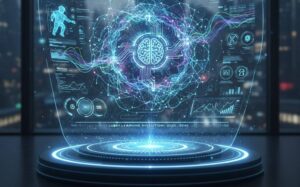
Quantum Computing in 2025: The Next Tech Revolution Explained Simply
Introduction
Imagine a computer so powerful it could solve in seconds what would take today’s best supercomputers thousands of years. That’s the promise of quantum computing—a technology that could revolutionize medicine, finance, AI, and cybersecurity by 2025.
But what exactly is quantum computing? How does it work? And why is everyone from Google to governments investing billions in it? Let’s break it down in simple terms with real-world examples.
What is Quantum Computing?
Traditional Computers vs. Quantum Computers
-
Classical Computers (like your laptop) use bits (0s and 1s) to process information.
-
Quantum Computers use quantum bits (qubits), which can be 0, 1, or both at the same time (thanks to a weird quantum physics rule called superposition).
This means quantum computers can explore multiple solutions at once, making them exponentially faster for certain problems.
Key Quantum Physics Concepts
-
Superposition – A qubit can be in multiple states at once (like a spinning coin that’s both heads and tails).
-
Entanglement – Qubits can be linked, so changing one instantly affects another, even if they’re miles apart.
-
Quantum Decoherence – Qubits are fragile and can lose their quantum state easily (a big engineering challenge).
How Will Quantum Computing Change the World by 2025?
1. Breaking Unbreakable Encryption
-
Today’s internet security (like banking and WhatsApp messages) relies on RSA encryption, which would take classical computers millions of years to crack.
-
A powerful quantum computer could break it in hours.
Example: Governments and companies are already working on quantum-resistant encryption to prepare.
2. Revolutionizing Drug Discovery & Medicine
-
Simulating complex molecules (like proteins) is too slow for classical computers.
-
Quantum computers could model new drugs in days instead of decades.
Example: In 2025, we might see quantum-designed medicines for diseases like Alzheimer’s or cancer.
3. Supercharging Artificial Intelligence (AI)
-
Quantum machine learning could train AI models much faster.
-
Better optimization for self-driving cars, weather forecasting, and logistics.
Example: Google’s quantum AI lab is already testing this.
4. Optimizing Financial Markets
-
Banks could use quantum computing for ultra-fast trading, fraud detection, and risk modeling.
Example: JPMorgan Chase and Goldman Sachs are investing heavily in quantum finance.
5. Solving Climate Change & Energy Problems
-
Quantum simulations could design better batteries, nuclear fusion reactors, or carbon capture materials.
Example: Companies like IBM are using quantum computing to improve renewable energy tech.
Who’s Leading the Quantum Race? (2025 Predictions)
| Company/Country | Progress |
|---|---|
| Achieved “quantum supremacy” in 2019; aiming for error-corrected qubits by 2025. | |
| IBM | Plans a 1,000+ qubit quantum processor by 2025. |
| China | Built a quantum computer 100 trillion times faster than supercomputers (2023). |
| Startups (Rigetti, IonQ) | Developing specialized quantum chips for businesses. |
Challenges Holding Quantum Computing Back
1. Qubits Are Unstable
-
They lose their quantum state easily due to heat, noise, or vibrations (called decoherence).
-
Current quantum computers need supercooling near absolute zero (-273°C) to work.
2. Error Rates Are High
-
Quantum calculations are prone to mistakes; error correction is a huge hurdle.
3. Not Yet Useful for Everyday Problems
-
Quantum computers excel at specific tasks (like cryptography or chemistry) but can’t replace laptops yet.
When Will Quantum Computers Be Mainstream?
-
2025: Still mostly in labs, but businesses will start using quantum cloud services (like IBM’s Quantum Experience).
-
2030s: Possible commercial breakthroughs in medicine, finance, and AI.
-
2040s+: Could become as common as supercomputers today.
Conclusion: The Quantum Future is Coming
Quantum computing sounds like sci-fi, but by 2025, we’ll see real-world impacts—from unbreakable encryption to life-saving drugs. While challenges remain, the progress is accelerating.
Will quantum computers replace your laptop? Not yet. But in the next decade, they could change everything from cybersecurity to cancer research.

